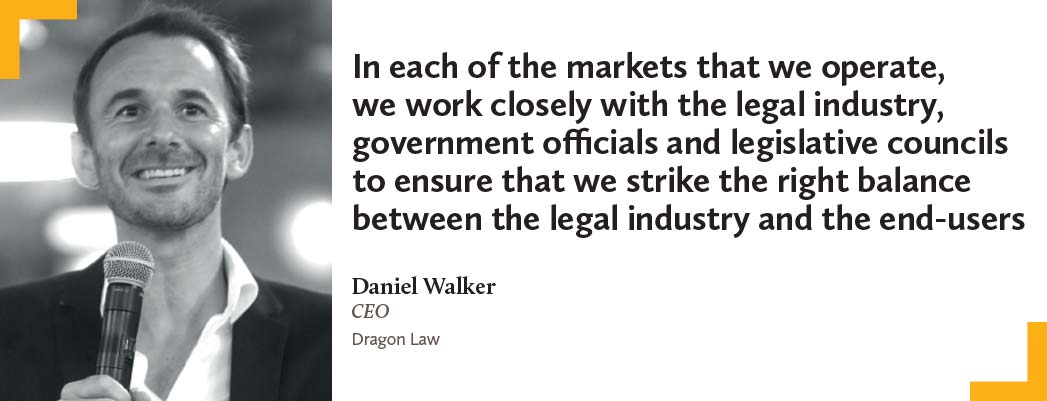Law firms, in-house teams and individual lawyers are all struggling to stay abreast of legal technologies, and while some are faring better than others, the ways in which tech is reshaping traditional practice are beginning to take shape. Leo Long reports
In August, Baker McKenzie became one of the latest international law firms that have adopted artificial intelligence (AI), mainly in handling M&A and other transactional work. The firm hired eBrevia, which employs AI or cognitive computing to analyse and extract information from contracts. According to Ned Gannon, CEO at eBrevia, based in Connecticut, its products allow non-technical users to “train” the software themselves to extract custom terms and meet specific needs.
While lawyers have to spend hundreds of hours analysing countless documents and conducting reports, this kind of AI tool does it in a few seconds, after “training”. That means law firms and their in-house counterparts can save time and money, and inevitably, their headcount of lawyers, by having AI do the repetitive work.
The threat has never been so close for lawyers now that the first batches of AI tools have landed their jobs in law firms since last year. But the legal tech story started at least 10 years ago, when pioneering companies like Rocket Lawyer and LegalZoom elbowed into the legal market to compete with traditional law firms and information companies. These young players changed the legal market with new business models that were quickly picked up by start-ups around the world.
But compared to other tech industries with billion-dollar investments, legal tech is still nascent, even for relatively developed regions in Europe or North America. In 2016, the investment in legal tech was only US$155 million for 67 deals, the biggest one being a US$18.6 million financing of e-Discovery software CS Disco, according to consultancy CBInsights. Nonetheless, it is undeniable that legal tech is rising.
Promising future
With economic growth in the Asia-Pacific region, Western legal tech pioneers have moved eastward. In early 2017, Cyril Amarchand Mangaldas deployed the AI tool Kira for its legal work, claiming to be the first law firm in Asia to use AI. In September, WongPartnership also embraced AI as the first Singaporean law firm of this kind adopting technology from London-based AI firm Luminance to support its corporate/M&A practice. The platform’s intuitive solutions to transaction documents ensure that the firm’s lawyers can focus on key documents from the outset to conduct due diligence and other contract review processes more effectively.
Noah Waisberg, the co-founder and CEO of Kira Systems based in Toronto, says its machine learning technology has gained “exciting momentum” in Asia.
“Just like in the other markets we’re present in, we’ve seen our customers in Asia adopt holistic approaches to innovation that show a real commitment to the long-term transformation of their business,” says Waisberg, who also sees “incredible growth in the number of legal tech companies and their impact on the practice of law across Asia”.
Gannon, from eBrevia, is also confident about his company’s growth in Asia. “The Asian market is open to adoption of legal technology,” he says. “To address the demand, we are rapidly iterating our software to meet the unique requirements of this market, including additional language capabilities and more pre-trained provisions.”
Learning from the Western forerunners, local tech-oriented legal start-ups are also mushrooming and catching up.
You must be a
subscribersubscribersubscribersubscriber
to read this content, please
subscribesubscribesubscribesubscribe
today.
For group subscribers, please click here to access.
Interested in group subscription? Please contact us.
你需要登录去解锁本文内容。欢迎注册账号。如果想阅读月刊所有文章,欢迎成为我们的订阅会员成为我们的订阅会员。
It’s not just individual lawyers; law firms are joining the competition, and China provides a good example. Top Chinese firms such as King & Wood Mallesons are investing in legal tech companies; JunHe has participated in a co-ordination platform for lawyers called Lvxie; and Han Kun Law Offices runs an agreement drafting platform called Jianfabang.
Challenges and opportunities
It is inevitable that some legal tech companies have been weeded out. When we review lists of legal tech companies launched in the past few years, some are no longer running and some haven’t shown any growth.
The competition is increasingly fierce after entrepreneurs rushed into the market, and bad performers will not survive. “There are legal tech solutions being built that over-promise and under-deliver,” says Rahiri. “There are also products being built where the design and user experience is poor. Knowing the pain points in running a deal, or managing a dispersed legal team, or building legal and compliancetools and products, requires knowledge of the industry. Solving those problems requires innovative thinking.”
Apart from improving competitiveness, legal tech companies in Asia, which is a complex region to operate in, also need to tackle barriers from governments, lawyers and users. This is especially so for those operating in more than one jurisdiction.
“This is largely due to the complexities in the legal systems and, to a lesser extent, business and cultural differences,” says Walker of Dragon Law. “However, there is a lot of demand for cloud legal services in the region and fewer competitors compared to the US and Europe.”
In contrast to China’s tolerance, the biggest challenge in countries like Malaysia lies in regulations on legal practice, which forms a relatively rigid ecosystem. “As far as Malaysia is concerned, the regulators still prefer to take the conservative position when it comes to technological innovations that involve non-lawyer third parties,” says Loo of CanLaw. He says there is a need for a clearly defined, engagement-based regulatory framework for legal tech startups in the long run.
Dragon Law faces a similar challenge when entering the Malaysian market. “Dragon Law is not aiming to disrupt the legal industry,” says Walker. “In each of the markets that we operate, we work closely with the legal industry, government officials and legislative councils to ensure that we strike the right balance between the legal industry and the end-users.”
It is clear that legal tech can benefit lawyers, but changing the traditional mindset of conservative lawyers, individuals and business leaders in the region to legal innovation is a huge task.
“The old model of legal services delivery is no longer sustainable and clients are expecting more value from their providers, faster turnaround and more transparent fee structures,” says Alintissar-Mooney of FLIP.
Andro says the number one challenge is building legal awareness. “We realize that the solution may solve the problem faced by the market, but the process of adaptation to the solution is not as easy as we thought,” he says, adding that a different strategy is needed to adjust to the market in Indonesia, for example.
One reason is that some lawyers, understandably, show an enmity with the idea that lawyers will be replaced by tech. But this is still open to debate. On Baker McKenzie’s adoption of AI in August, the firm’s partner, Andy Leck, revealed ideas shared by many legal tech leaders: first, technologies will help lawyers but not replace high-value human talent input; and second, lawyers need to be equipped well with knowledge of technology in order to adapt and catch up.
It also may be soothing for some to understand that innovation is not omnipotent. According to a general counsel report by GlobalLegalPostc.com, about 30% of respondents think that communication with their law firms has not been improved though law firms seeking innovations for working with clients.
More think law firms are not trying to understand their legal needs. How to stay true to the mission of serving clients better and tackling their pain points is a question to answer for both innovative lawyers and legal tech entrepreneurs.
[/ihc-hide-content]





























